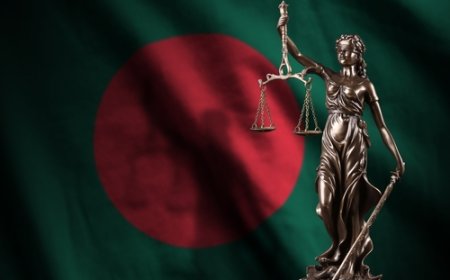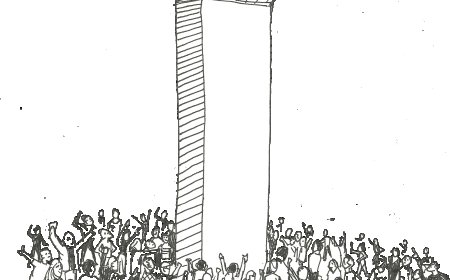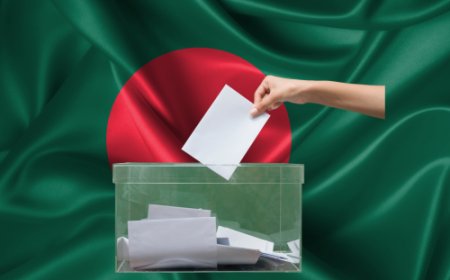How Do We Rebuild Our Democracy?
The real victory of any revolution lies not in the fall of an old regime but in the birth of a culture that resists repeating its mistakes. Bangladesh’s revolution will have meaning only if it leads to a politics that listens, includes, and endures.

Bangladesh is once again standing at a historical inflection point. The euphoria that followed the mass uprising and the fall of the previous order has begun to dissipate, replaced by uncertainty, contention, and quiet anxiety about the nation’s direction.
The promise of a new democratic beginning, anchored in the ideals of reform and accountability, now faces a sobering test: whether the country can move beyond political polarization and institutional mistrust toward genuine democratic consolidation.
The early optimism surrounding the July Charter, envisioned as a consensus roadmap for reform and inclusion, has gradually turned into discord. Instead of uniting the political spectrum, the debate over its implementation has deepened old divisions and created new ones.
What was meant to symbolize reconciliation is now the flashpoint of renewed partisanship. The conversation surrounding the “Note of Dissent” reflects a deeper crisis, not about one document or another, but about the inclusivity of policymaking itself.
The fragility of Bangladesh’s transition is evident in how easily cooperation has given way to confrontation. Dialogue, once hailed as a sign of maturity, now risks becoming performative — an exercise in optics rather than substance. The essential question confronting the nation is not whether reform is necessary, but whether it can be achieved without trust. When participation is perceived as symbolic and dissent as disruptive, dialogue loses its moral weight, and consensus becomes a myth.
The current deadlock is no longer confined to partisan battles; it is embedded in the very structure of governance. The interim administration, tasked with overseeing reform and preparing for elections, is caught between its limited constitutional authority and the vast expectations placed upon it. Its legitimacy depends on maintaining neutrality, yet every decision, from the timing of a referendum to the interpretation of the July Charter, risks being seen through the lens of political interest.
This uncertainty has real consequences. Political instability erodes both institutional confidence and economic momentum. According to recent data from Bangladesh Bank, foreign direct investment fell by nearly one-fifth in mid-2025 compared to the same period last year, reflecting investor hesitation amid prolonged uncertainty. Inflation continues to hover around double digits, while the taka’s depreciation against the dollar has increased import costs and strained household budgets. The economy, which once seemed poised for recovery, is now in a fragile state of limbo.
But the economic tremors only mirror a larger social unease. The same citizens who filled the streets demanding change now feel distanced from the process they helped ignite. Surveys by governance research centers show a growing perception that political reform is being shaped more by elite negotiations than by public consensus. This disconnect is perilous because when people no longer see themselves reflected in political transitions, democracy risks becoming a spectator sport rather than a participatory process.
The polarization that marks today’s political climate did not emerge overnight. It is rooted in decades of zero-sum politics where every party saw power as an end rather than a means to serve. The result is a political culture where dialogue is transactional, compromise is suspect, and opposition is treated as treachery. Without a deliberate effort to change this mindset, even the most well-intentioned charters or commissions will falter.
Comparative political experience suggests that transitional societies often stumble at precisely this stage. When reform agendas become politicized, when institutions lack autonomy, and when public patience wanes, backsliding becomes almost inevitable. Studies of post-revolution states indicate that within two years of regime change, roughly forty percent experience renewed instability or authoritarian drift if consensus mechanisms fail. Bangladesh’s current moment bears an unsettling resemblance to that pattern.
The danger lies not in disagreement but in distrust. Disagreement, if managed within democratic norms, can be productive. Distrust, however, corrodes the very foundations of cooperation. When opposing sides view each other as existential threats rather than competitors within a shared framework, the space for dialogue shrinks and governance becomes an endless cycle of contestation. The ongoing disputes over referendum timing, interim authority, and constitutional interpretation are symptoms of that deeper malaise.
This erosion of trust also extends to the institutional sphere. The judiciary, the election commission, and the bureaucracy — all critical pillars of democratic transition — face pressure to prove their neutrality. Yet neutrality is not merely a matter of posture; it requires capacity, credibility, and independence. In many transitional settings, institutions fail not because they lack formal authority but because they lose public confidence. Once citizens begin to suspect that outcomes are predetermined, the legitimacy of every process, even elections, becomes vulnerable.
The solution cannot lie in procedural fixes alone. Genuine reform requires a moral recalibration, a collective commitment to put national interest above partisan gain. The July Charter, in its original spirit, embodied this aspiration: a recognition that the future of Bangladesh depends not on one party’s victory but on a shared willingness to govern responsibly. That spirit must be revived if the current transition is to endure.
Yet rebuilding consensus is no easy task. It demands humility from those in power and patience from those out of it. It requires an acknowledgment that governance is not about winning every argument but about ensuring that no voice feels excluded. Transitional governments around the world that succeeded, from Indonesia in the late 1990s to South Korea in the 1980s, did so by institutionalizing dialogue, protecting dissent, and allowing reform to be incremental but irreversible.
Bangladesh’s transition is at risk of becoming trapped between two impulses: the urgency of reform and the fear of change. The temptation to consolidate power under the guise of stability is ever-present, as is the tendency of opposition forces to reject every compromise as capitulation. The challenge is to resist both extremes. The legitimacy of the new political order will depend less on its rhetoric of reform and more on its capacity to deliver fairness, predictability, and participation.
The coming months will be crucial. The referendum debate, the upcoming election, and the management of institutional relationships will determine whether Bangladesh emerges as a stable democracy or slips into another cycle of confrontation. The stakes are higher than they appear, for what is at risk is not just political balance but the moral foundation of governance itself.
Bangladesh’s history is one of extraordinary resilience. Each period of crisis has been followed by renewal, sometimes slow, sometimes painful, but always driven by the people’s insistence on dignity and justice. That resilience must once again be summoned. The promise of the July Charter can still be redeemed if political leaders treat dissent as a form of dialogue, not defiance; if institutions serve the constitution, not expediency; and if citizens refuse to surrender hope for cynicism.
The real victory of any revolution lies not in the fall of an old regime but in the birth of a culture that resists repeating its mistakes. Bangladesh’s revolution will have meaning only if it leads to a politics that listens, includes, and endures. If the spirit of reform becomes another casualty of rivalry, the cost will not be measured in lost elections but in lost faith, and that, in any democracy, is the gravest loss of all.
Writer: H. M. Nazmul Alam is an Academic, Journalist, and Political Analyst based in Dhaka, Bangladesh. Currently he is teaching at IUBAT. He can be reached at [email protected]
What's Your Reaction?














































































